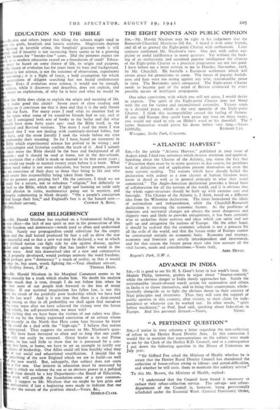—Mr. Harold Nicolson in his Marginal Comment seems to be
uneasily for a truth which eludes him. No doubt his analysis tains much that is true, though I do not follow him when he that most of our people look forward to the loss of many ities. If our national imagination has fallen low, is not this ely the result of the painfully poor leadership which we have had the last war? And is it not true that there is a deep-rooted ng among us that in all probability we shall again find ourselves the same mess after we have achieved the victory over the forces vii which, for self-preservation, we must win? his feeling that we have been the victims of our rulers was Mus- ed to me by the firmly expressed conviction of an artisan whom et recently in the North that Hess came here because he knew he could do a deal with the " high-ups." I believe that notion Widespread. That suggests the answer to Mr. Nicolson's ques- We have been betrayed so often and so long that our confi- e will not easily be restored. Great leader as is our Prime inter, he has said little to show that he is possessed by a con- an that here, at home, we have to set an example to justify our claims of leadership. Our Allies could tell him forcibly what they of our social and educational stratification. I should like to something of the new England which we are to build—as well the new world. But, unhappily, that subject does not seem be a live one. Our interest in education must be measured by way in which we tolerate the use as an obvious power in a political e of what should be a key Department—the Board of Education, se work will provide the foundation-stone of a new common- di. I suggest to Mr. Nicolson that we might be less grim and e enthusiastic if just a beginning were made to indicate that our r3 saw the nature of the problem ahead.—Yours, &c., MIDDLE-CLAM


































 Previous page
Previous page